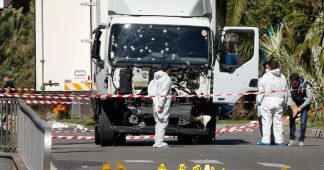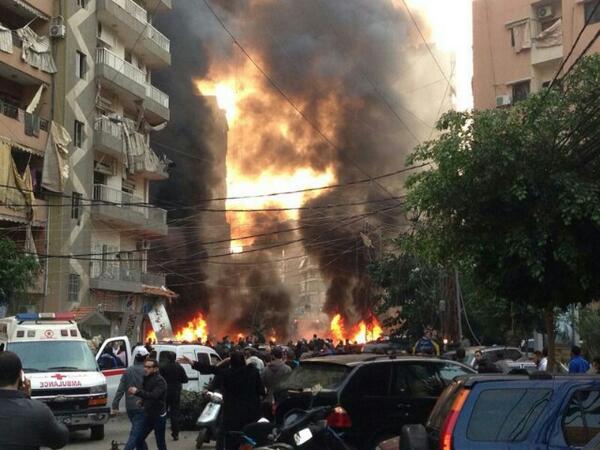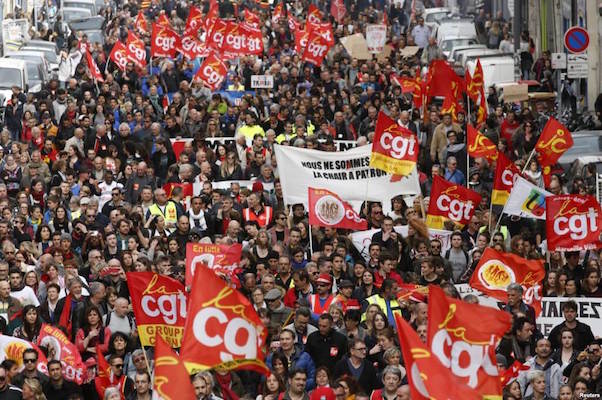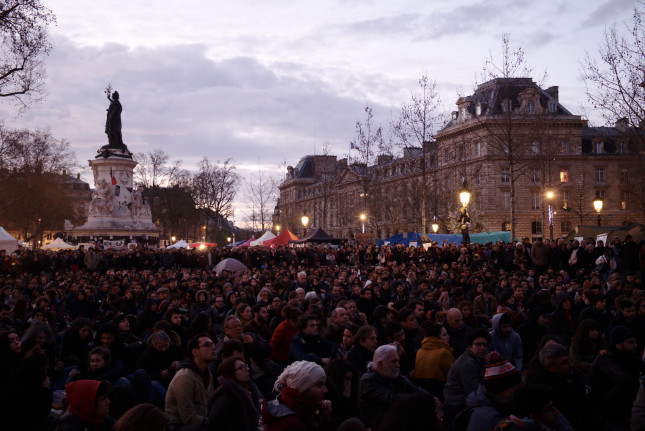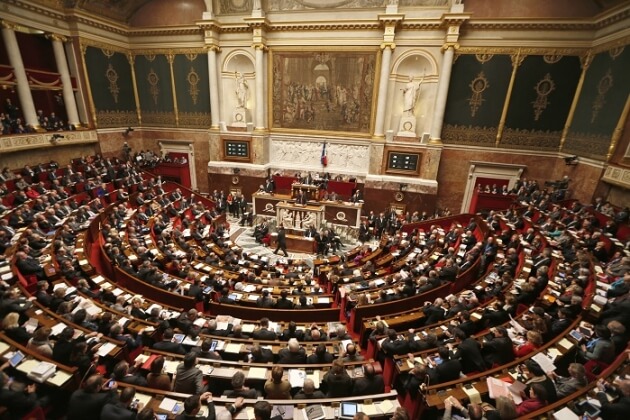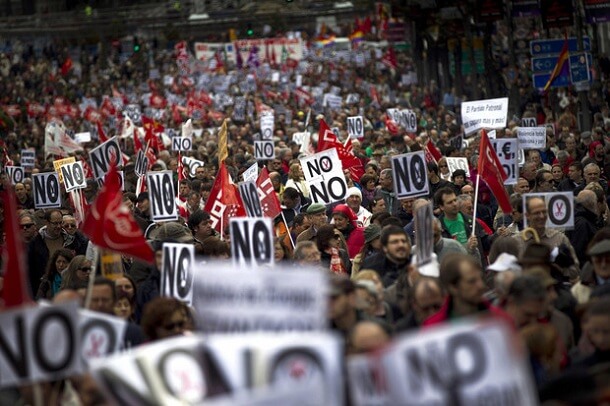More than 84 people are dead in Nice, France, after an attack on a crowd of people celebrating Bastille Day in the city in the French Riviera. Witnesses said a man in a large truck deliberately drove into a massive crowd watching a fireworks celebration. The truck continued driving a mile, mowing down people in the crowd. No group has taken responsibility for the attack. French media have identified the driver of the truck as Mohamed Lahouaiej Bouhlel, a French man of Tunisian descent who lived in Nice. Earlier today, French President François Hollande announced he would extend the state of emergency put in place after the Paris attacks which killed 130 people eight months ago. We go to France to speak with Palestinian-American playwright Ismail Khalidi in Nice and French human rights and civil liberties activist Yasser Louati in Paris.
TRANSCRIPT
JUAN GONZÁLEZ: More than 84 people are dead in France after an attack on a crowd of people celebrating Bastille Day in a city in the French Riviera. The dead include as many as 10 children. Another 18 people are critically injured. Witnesses said a man in a large truck deliberately drove into a massive crowd watching the fireworks celebration. The truck continued driving a mile at high speed, mowing down people in the crowd. Survivors described horrific scenes on the streets of Nice.
KARIM LAAMARA: [translated] There were people on the ground, yes, only people on the ground—many, many. I was trying not to look. I tried to look up. I didn’t want to see. It was too painful. There were people crying, people covered in blood, people covered in blood everywhere. It is so sad.
AMY GOODMAN: No group has taken responsibility for the attack. French media have identified the driver of the truck as 31-year-old Mohamed Lahouaiej Bouhlel, a French man of Tunisian descent who lived in Nice. He was shot dead by police during the attack. Earlier today, French President François Hollande announced he would extend the state of emergency put in place after the Paris attacks, which killed 130 people eight months ago.
PRESIDENT FRANÇOIS HOLLANDE: [translated] I have decided that the state of emergency, which should have ended on July 26, will be extended for another three months. A bill will be presented to the Parliament in the coming week. Nothing will make us yield in our will to fight against terrorism. And we will once again reinforce our activities in Syria and Iraq, and we will continue to strike precisely those who strike us on our own soil in their hideouts.
AMY GOODMAN: We’re joined right now by two guests: from Nice, France, Ismail Khalidi, a Palestinian-American playwright and writer—he was in Nice visiting his family—and in Paris, Yasser Louati, a French human rights and civil liberties activist and researcher.
We welcome you both to Democracy Now! Ismail Khalidi, you were there last night. While you didn’t see the truck, you certainly saw the aftermath of people running. Can you tell us what you experienced?
ISMAIL KHALIDI: Yeah. Hi, Amy. Hi, Juan. Yeah, I, fortunately, was not at the scene and did not witness the carnage, but I was probably about six blocks down the Promenade des Anglais from where the attack took place and where the fireworks had just ended. And there was really thousands and thousands of people—families, tourists—congregating. And all of a sudden, we witnessed what really, essentially, amounted to a stampede of people shouting, screaming, and a lot of confusion, obviously, resulted from that, as there was not really very clear information about what was going on, only that the police had told people to run. And they followed—they followed suit. You know, one of probably the most harrowing things we saw last night was a young father jettisoning his two kids over a fence and then clambering up the fence himself in order to get out. But it was really—I mean, it was obviously a horrible, horrible night here in Nice. And it was quite chaotic and confused. And there was not a lot of information, I’ll say, in the aftermath from the police on the streets about where people should go and what they should do next.
JUAN GONZÁLEZ: And what have you been able to learn, or have we been able to learn, since the attack about the man who led the attack, was in the truck and was killed?
ISMAIL KHALIDI: Yeah, I mean, I think that you guys reported a little bit on it. What I’ve read is that he’s a local Nice resident, a French—young French man of Tunisian, I think, descent, with a, you know, petty criminal record, as far as I know. But, I mean, it seems to me that he fits the bill of a lot of these attackers from the Paris attack, for example, of November 13th, of young, alienated immigrant men who, in many cases, grow up in marginalized ghettos in French cities and who have criminal records and carry out acts of violence. But I actually can’t speak to much more than that. That’s what I know. I do know that Nice, from where I am right now, more or less in the center of the city, seems to kind of be going about business as normal. I mean, I think that probably where the attack took place is obviously, I’m guessing, shut down at this moment.
AMY GOODMAN: Yasser Louati, you’re in Paris, French President François Hollande has left there and gone to Nice, where he has just arrived. There was a state of emergency ending next week, after the attacks in November. He has now said that they will be extended, and France will increase its presence in Iraq and Syria. Can you talk about what you understand about what happened and what’s happening in your country, France, today?
YASSER LOUATI: Hi, Amy. Hi, Juan. This is a feeling of déjà vu. This is my fourth time on your show, and I’m going to repeat the same things again, unfortunately. It’s a great confusion coming from the government. But first we have a question: How sure can we be that this is a terrorist attack, and does it even qualify as such? I mean, like the culprit is—well, was known to be nonreligious, made no political claims, left no letter behind him. He was known to be a womanizer, a salsa lover, who was isolated and had no connection whatsoever to any organization. And so we need to leave time enough for the government to do its job [inaudible] and Justice Department to really identify the motives behind this attack.
What we should keep in mind is that President François Hollande, on July 14th, yesterday morning, was saying that he was going to lift up the state of emergency, that it will be over on July 26. The very same day, around, I think, 10:00 p.m., he said that, you know, they are going to extend it for three months. But talking about the state of emergency, you know, it’s been in full effect since last November, and it did not bring any more protection to us as everyday citizens, nor did it crack down on this terrorist threat. At the same time, you know, the Sentinel Operation, which means the presence of military people in big cities and major public areas, has not shown its effects. And even the repressive laws that have been passed since November, and also the enhanced powers given to the intelligence community, to the police and the government itself, did not protect us in any way whatsoever. And we should go back to the 2013 confidential report from the domestic intelligence saying that the government is failing by adopting security measures alone and should take into consideration the financial, social and identity crisis, you know, deep-rooted in this country. About four or five days ago—
JUAN GONZÁLEZ: And, Yasser, I just wanted to ask you, what—you mentioned the emergency—the emergency decrees. What is the impact on the Muslim community of the United States of these emergency powers?
AMY GOODMAN: France.
JUAN GONZÁLEZ: I’m sorry, France.
YASSER LOUATI: Yeah, I mean, like, you know, this state of emergency has led to over 3,600 raids, leading only to six inquiries on terror charges. In the meantime, you have dramatically used the Muslim community as a scapegoat to divert attention from the government’s failures to protect the people of France and, at the same time, to review its own policies both abroad and here at home. When you have Human Rights Watch, the U.N., Amnesty International and various human rights organizations saying that the state of emergency did not help in reducing the terror threat, but targeted the Muslim community to hold it responsible, at the same time, again, we have received two waves of terrorist attacks in 2015. Nobody resigned. Nobody took responsibility. Nobody got sacked. So, the government cannot, you know, flee its responsibilities and keep holding minorities responsible for those very same failures. I was saying a couple of days ago there was a parliamentary inquiry released, you know, by the National Assembly pointing to the fact the intelligence community in France has historically failed. So, when you keep, you know, piling up all these reports and the government keeps repeating that it’s going to repeat the same strategy, then, I’m sorry, you have a person from Nice killing people from Nice—why would bombing Syria and Iraq give us any more security?
AMY GOODMAN: Ultimately, what do you want to happen right now? We have about 30 seconds, Yasser.
YASSER LOUATI: It’s on the French government to review our foreign policy. How come we became this enemy number one for these terrorist organizations? We need to have an upstream strategy that takes into consideration all the facts that lead to terrorist attacks, and then we have to listen to what the professionals say. We cannot use security-based measures alone when they turn out to be countereffective. And the last point is that—don’t forget that in the famous article from ISIL called “Destroying the Gray Zone,” saying that we need these terrorist attacks so the Muslim community will be cast aside, stigmatized and persecuted. This will help hire more people and bridge the—and bring a divide between Muslims and non-Muslims, and make it impossible for these two communities to live together in peace.
AMY GOODMAN: Let me play for you what Newt Gingrich, one of the—what’s believed to be the three people on the short list for Trump for vice president—that’s Newt Gingrich; the New Jersey governor, Chris Christie; and the Indiana governor, Pence. But this is what Newt Gingrich said last night, speaking on Fox News.
NEWT GINGRICH: Western civilization is in a war. We should, frankly, test every person from here who is of a Muslim background. And if they believe in Sharia, they should be deported.
AMY GOODMAN: Newt Gingrich, the former House speaker in the United States, is talking about Americans being deported who believe in Sharia, after the Nice attack. Yasser Louati, respond.
YASSER LOUATI: Well, this—so much ignorance from [inaudible] politicians is just—just beyond words. The Western world is not at war with Islam, because there are Western Muslims being killed in the West by terrorist organizations. Second, I think Newt Gingrich should send his résumé to ISIL and get a job there, because he’s doing exactly what they’re asking for. They kill us here, and then these politicians play into their hands, dividing people further and then continuing this job of the terrorist organizations. Unfortunately, this will go on. And what Gingrich is saying, you know, joins what Trump is saying, even Hillary Clinton are saying, with they are waging war on terror. Should I remind them of what Brzezinski said about the war on terror, that it’s a fallacious concept, it’s a self-fulfilling prophesy? And how about this 16-year-old war on terror? For 16 years, $4,400 billion spent, hundreds of thousand people being killed, and the multiplication of terror, of terror organizations. But I have a question for them: How about prosecuting the very same people who led to the emergence of ISIL? I don’t know—like George W. Bush, the neocons who were in the White House, Tony Blair. And we can use the Chilcot report to prosecute these people.
AMY GOODMAN: Yasser Louati, we want to thank you very much for being with us—
YASSER LOUATI: Thank you for having me.
AMY GOODMAN: —French human rights and civil liberties activist and researcher, and also—he was speaking to us from Paris—Ismail Khalidi, who was speaking to us from Nice, France, where the attack occurred last night. At least 84 people have been killed.
This is Democracy Now! When we come back, where does the debt that it has been said Puerto Rico owes come from? Stay with us.
